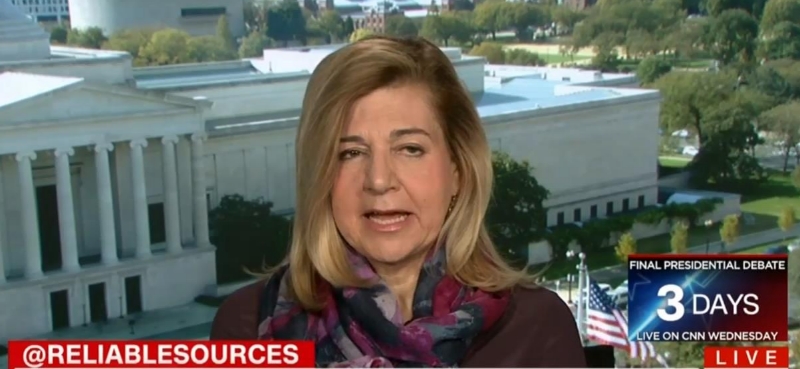GOP nominee Donald Trump is alleging the game is rigged against him from a disturbing combo of inevitable voting fraud and slanted media coverage of the campaign. Predictably, media stalwarts blithely dismiss Trump's allegation as paranoid and delusional.
Perhaps they should not be so quick to laugh it off, given the media's track record when it comes to fiction fobbed off as journalism.
An example of this could be seen on the most recent Reliable Sources with host Brian Stelter, a former media reporter for the New York Times, discussing Trump's allegations with Margaret Sullivan, media reporter for the Washington Post and former public editor (what used to be called ombudsman) at the New York Times, and former Bush speechwriter David Frum --
STELTER: And the issue is, how do we persuade that, say, 40 percent of the country that is inclined to believe Trump when he says the media's colluding? Let me give you an example, Margaret. You were the public editor at the New York Times and did you ever find evidence that the Times' reporters would make up sources (Stelter making air quotes gesture with his hands) the way Trump is alleging?
SULLIVAN: No. I mean, there's, there's no reason to think that. I mean, I was critical of the Times' use of anonymous sources but I never thought that they were made up.
STELTER: Right. (changing the subject). So, let's talk about the conservative media crack-up that's happening ...
Right -- "there's no reason to think that," Sullivan claims -- providing that one ignores an obvious reason to think so, namely the role of the Times in a major journalism scandal -- one of its reporters, Jayson Blair, inventing sources, fabricating quotes, plagiarizing other reporters, and repeatedly claiming to report from places he didn't go.
So appalling was Blair's conduct that after he was fired in May 2003, the Times published an epic 7,200-word mea culpa that jumped from above the fold on page one to four full inside pages. Little more than a month later, the paper's executive editor, Howell Raines, and managing editor Gerald M. Boyd, resigned for their roles in providing Blair with a platform for his duplicity.
I'll take Sullivan at her word that she found no evidence of Times' reporters engaging in fraud while she was public editor from 2012 to early 2016 -- just as she should be willing to acknowledge that previous editors at the paper most certainly did encounter evidence of fraud, and paid dearly for it.
Had Blair been an outlier, more people would have greater confidence in accuracy and fairness in reporting. He wasn't. Only a few years earlier, The New Republic, a flagship progressive periodical that touted itself in 2014 as having "invented modern liberalism" upon its founding a century earlier, was forced to admit that one of its staff writers, Stephen Glass, fabricated dozens of stories. Sullivan's amnesia is all the more puzzling when one considers she now works for a paper that was awarded a Pulitzer in 1981 for a story purporting to describe the life of an 8-year-old heroin addict -- -- whereupon it was quickly discovered that the reporter who wrote the story, Janet Cooke, invented her subject from whole cloth. Worth noting is that the Cooke scandal came only five years after Hollywood lionized the Washington Post for its role in bringing down Richard Nixon during the Watergate scandal. Not surprisingly, a still from the movie is prominently displaced across the top of Sullivan's Twitter page.
Sullivan's amnesia is all the more puzzling when one considers she now works for a paper that was awarded a Pulitzer in 1981 for a story purporting to describe the life of an 8-year-old heroin addict -- -- whereupon it was quickly discovered that the reporter who wrote the story, Janet Cooke, invented her subject from whole cloth. Worth noting is that the Cooke scandal came only five years after Hollywood lionized the Washington Post for its role in bringing down Richard Nixon during the Watergate scandal. Not surprisingly, a still from the movie is prominently displaced across the top of Sullivan's Twitter page.
More recently, the online site The Intercept fired a reporter in February after its editors uncovered a "pattern of deception" that included fabricated quotes.
At least with Blair, Glass and Cooke, their jaw-dropping deceptions resulted in them getting drummed out of journalism. Such is not always the case, as with longtime columnist Mike Barnicle. Back in 1998, the Boston Globe gave Barnicle the boot after crosstown rival Boston Herald ran a story about unsettling parallels between a Barnicle column and George Carlin's book "Brain Droppings." By then the Globe had fielded complaints about the veracity of Barnicle's columns for years, to the point where Boston magazine ran a Barnicle Watch column to detail the most glaring examples.
Within several months, Barnicle was back as a contributor on the television show Chronicle that airs in the Boston television market. He was soon writing columns again, first for the New York Daily News and then the Boston Herald. You're most likely to see him these days as a regular panelist on MSNBC's Morning Joe. Surely at least some of the show's viewers remember this about Barnicle and wonder how he manages to retain any credibility.
Sullivan has been cited by NewsBusters several times over the years, including a post for her grudging acknowledgment of the Times' liberal slant. But in her appearance on Reliable Sources, she was clueless at best and disingenuous at worst to suggest no reason whatsoever for anyone to suspect that those employed at the New York Times may occasionally let their imaginations take flight.




